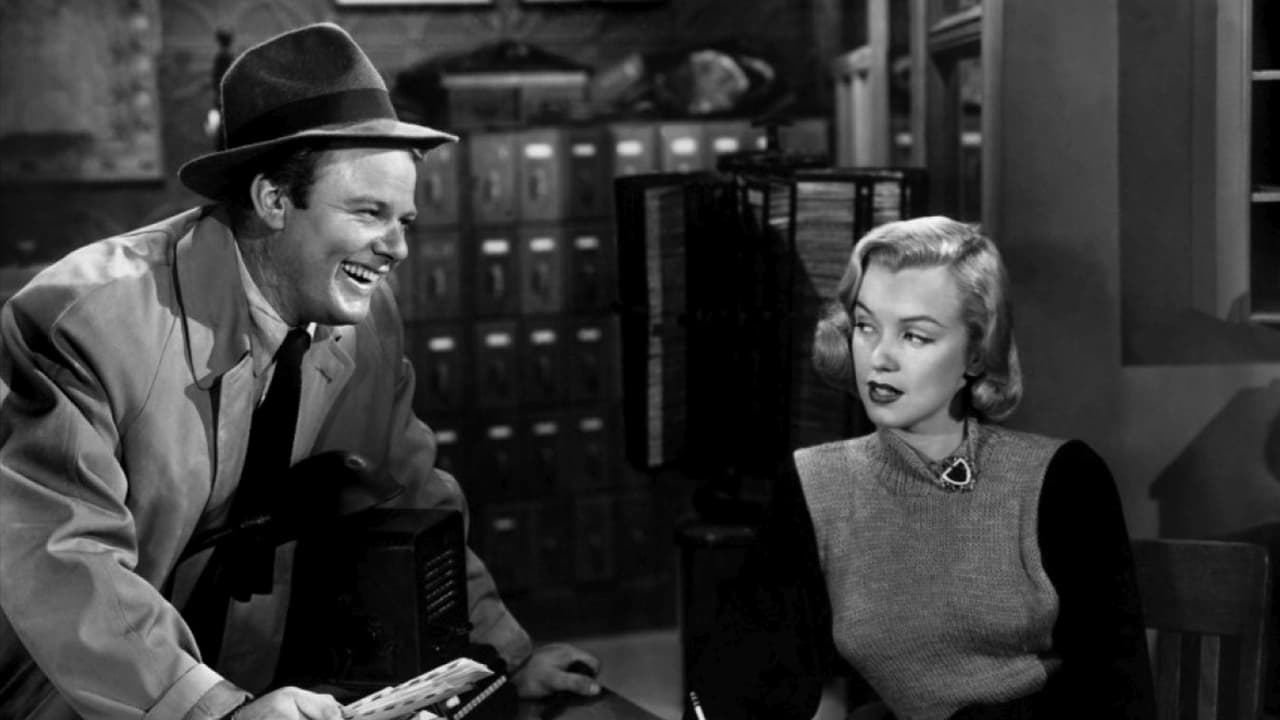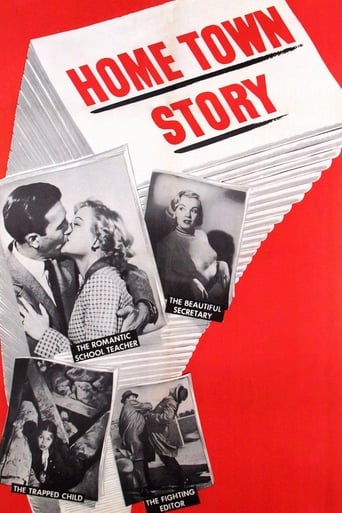

Arthur Pierson, I forgive you. Now that I've finished watching Home Town Story, and figured out the back story, I'm having such a good laugh, tears are coming down my eyes. Actually, it's the viewer commentaries that deserve the credit for the latter.However, midway through, I would have strangled you, if you were still alive. It was starting to look like a real insult to journalism, a hatchet job on the so called liberal establishment press. There is nothing realistic about what this Blake Washburn character does, namely putting personal opinion pieces on the front page, along with opinionated headlines. No publisher would put a failed politician as the executive editor of a paper where he would be covering the guy who defeated him. The John Hale, Jr. character makes amends for this travesty, submitting his resignation, like a true journalist. I had to turn this off and pick it up the next day, I was so ticked off. I spent the day mystified about how such a simplistically propagandist film could come out of Hollywood. It was 1951, the height of the Communist witch hunt in Washington, started by a Congressman from California named Richard Nixon. So perhaps this film was made to appease the right wing gods who were throwing Hollywood writers and actors in jail. I was having trouble imagining someone actually paying money to watch this in a movie theater, even as a B movie second show. I just didn't make sense. One viewer may have hit the nail on the head when he likened it to the movies he had to watch in 7th grade social studies class. For this movie was actually produced by, believe it or not, General Motors, along with something called Wolverine Productions. I found this on the TCM site, but "The Deputy"'s 2004 review on IMDb has this detail: "The film production was supervised by the head of GM's film division, John K. Ford. The film was meant as corporate propaganda for GM ...." OK, now things are starting to make sense. Sure, as propaganda (or as Americans put it, PR) the movie is a bit obvious and clunky. But, hey, capitalism is entitled to pat itself on the back, as long as it's paying the tab -- about $200,000. It's not clear where this was actually shown back in the Fifties. Social studies classes? Hey, with Marilyn Monroe in a tight sweater, the guys are going to stay awake! Could that be the clever reason she's in there? The script is pretty bad, but acting by Hale, Donald Crisp and Monroe saves the film. Of course, the great irony is that Monroe's brief appearance has given this stinker -- which, for all we know, may never have been seen in the Fifties outside of GM's boardroom -- immortality. None of us would be watching this today if it weren't for her, except perhaps on a Christian propaganda station. I wonder if they are, indeed, running it? After all, it's not every day you get to see Marilyn Monroe playing a vestal virgin.
... View MoreThis certainly has to be rated as one of the least interesting movies I've ever seen. I don't think I would go as far as to call it bad - simply dull would be a better word for it. It features passable performances from most of the leads (including a limited role for Marilyn Monroe as a sexy secretary with only a handful of lines) but aside from some suspense about the fate of little Katie in the last 20 minutes or so there really wasn't much here to hold my attention.The movie starred Jeffrey Lynn as Blake Washburn - a one term state senator who's defeated for re-election and can't let it go. In fact he's the poster boy for sore losers, ready to pick fights with anybody who brings his defeat up, and convinced that the people were tricked into voting for his opponent. Frankly, he was a thoroughly unlikable character. Returning to his hometown, he uses his new position as editor of the family-run newspaper to criticize the man who beat him and to take on a variety of crusades, most notably against excess corporate profits. In that sense, the movie perhaps had some potential to provide a degree of social analysis, except that there was always question as to whether Washburn really cared about these issues, or whether he was simply using the paper as a platform to launch another election bid. In the end, the movie actually becomes a celebration of the system, as Washburn learns why profits are necessary, and how a company's profits benefit us all.I found this most interesting for the very early look at Monroe, as well as for a look at a not bad piece of work from a young Alan Hale, Jr., who I know best as the Skipper from "Gilligan's Island." One thing really made me curious - how could Lynn play the brother of young Katie, played by Melinda Plowman, who got a few years as a bit player out of an acting career? Lynn would have been 42 when this was made, Plowman about 10. The family relationship was not at all believable. 4/10
... View MoreA bit corny in its attempt to show how capitalism works when it isn't corrupted by heartless unsavory and greedy corporate criminals."Hometown Story" has to do with defeated local state senator Blake Washburn, Jeffrey Lynn, who's so embittered over his being turned out of office that after going back to his old job as editor of the Fairfax Herald decides to become a crusader against corporate corruption. Which in reality is attacking his opponents the new state senator McFarland, who defeated him, fathers business.A angry young man with a chip on his shoulder Blake gets so involved in his anti-capitalistic crusade against old man John McFarland, Donald Crisp, over his sons defeat of him in the state elections that he completely overlooks the fact that the plant that he owns is the cleanest most environment-friendly and best run in the state. This make a now frustrated Blake turns his guns, or editorial, against every big business in the country who makes a profit regardless if it's done honestly or not! Trying on Blake's part to create a peoples revolution against big business/capitalism. This mindless action by Blake in 1951, at the hight of the Cold War, could well have had him both arrested and tried by the FBI and US Justice Department for treason!Blake even though a likable guy is so obsessed with getting re-elected that he turns everyone who knows him like his fiancée Janice and best fiend reporter Slim Haskins, Marjorie Reynolds & Alan Hale Jr, against him. This leads Slim to almost end up almost punching him out in a confrontation he has with Balke in his office. It takes a conversation that Blake has with John McFarland to fills the hot-headed editor in with what capitalism did in making America the great country that it is today. Later the near tragic accident that almost killed Blake's sister Kathy, Melinda Portman, and McFarland rescue of her that turned him in his negative ideas of capitalism around. Kathy trapped in a coal mine collapse, together with her new puppy Rags, painfully showed Blake the light as the forces of capitalism and the free market quickly and efficiently swung into action. Old man, and business tycoon, McFarland using all the earth moving equipment that he had at his disposal ended up saving little Kathy's and her dogs life. In the end Blake now finally saw what capitalism had to offer the common working man and woman, and it was good. This all caused Blake to changed his mind as he became the biggest supporter of the capitalist system in the state. Rewriting and reediting all the bad things and press that ever said or wrote about big business making big bucks Blake now sees how important the benefits of capitalism is for the average working man and woman as well. Now with Blakes support all those big bucks will in the end help those, like his sister Kathy, who at first didn't seem to get, or benefit from, them. A bit condescending for my tastes in how great it is for corporations to make obscene profits which, we could only hope, in return helps all of us.P.S Look for a young and scintillating Marilyn Monroe in the film in a bit part as sexy and unavailable, to at least the overly friendly Slim Haskins, Iris Martin. Iris' tight fitting sweaters are enough to make me want to get a job at the Fairfax Herald regardless of what I'll be paid in wages just so I can even get lucky enough to buy Marilyn a cup of coffee and have a chance to talk to her.
... View MoreThere are several problems with this movie. There is not much of a plot. The dialogs leaves a lot to be desired. The minor characters are not well developed or defined. And the pace is snail like. However, the main problem I have with this story is that the lead character, Blake Washburn, is not even close to being a likable fellow. While I understand he was supposed to be pushy, driven and opinionated, the plain fact is that he was just a Jackass. (Can I say that?) As a result, it is a real stretch to expect the audience to care about him. There is an accident involving his little sister, but we have not spent enough time with her to get to know and like her and you have to like before you can care. We care about this little girl's plight, but only because she is a child - any child would solicit the same response. Do we really care it was his sister? I will not say the movie totally sucked, but I will say it left me unmoved and empty. There were, however, two performances that worked Alan Hale Jr. gave a pretty good performance as ace reporter and friend of Washburn, as if this guy could really have a friend. Donald Crisp gave the best performance of the lot as industrialist John MacFarland who displayed a even balance of quiet ambition, intellect, drive and humanity to stand out from all the other characters even though he did not really have that much screen time.
... View More